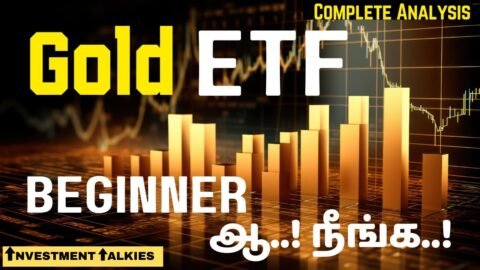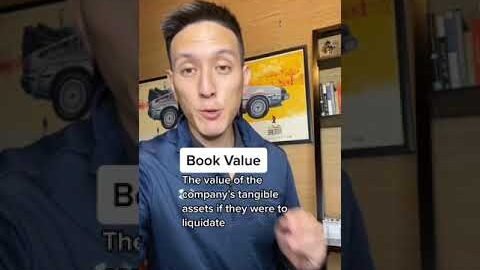Get $50 off Alpha Picks: https://buildinvestlive.com/go/saalphapicks Get $30 off Seeking Alpha Premium: …
source
You might like

How to invest in Gold ETF for beginners | Complete Details on Gold ETF Investment Talkies
0 views
·
34 minutes ago










well if from 2007 to 2023 is 26 years to you… maybe you can’t do math.
Share price goes down by dividend amount
Dividends are taxed
No bueno
Great video … Understandable, clear, concise, and timely. Beautiful delivery and editing. Thank you very much.
Great video > lots of golden nuggets explained in a simple manner ( no fluff) > New Subscriber here!
Im 21 now.
My portfolio will look like this:
▫️ETF:
Core S&P500 ishares, acc, 0,07% exp ratio
💰35% of my capital
▫️Dividend stocks:
not decided yet but Johnson Johnson, JP Morgan, Microsoft, Coca Cola, Procter & Gamble
gonna pick 2 or 3
💰30% of my portfolio
▫️Growth stocks:
NVIDIA, Tesla, Amazon, Meta, Alphabet, Palantir, Apple, Microsoft (also a dividend stock)
💰25% of my portfolio
▫️Crypto:
Bitcoin, other projects (maybe XRP, Solana, Ethereum)
💰10% of my portfolio
Maybe I will change the capital allocation a little bit but that’s my plan.
Hope I can retire at 40.
If I hold for 40+ years, it’s gonna be multi million if I invest 1k-5k per month.
Also keep some liquidity for dips and reduce monthly investments if we are very high in the range, like peaking at an all time high.
Dollar cost averaging is the most powerful I guess but with heavy dip oriented investments.
Didn’t buy the dip in April 2025 but I assume we will see a retracement soon in summer (June,…).
I think I’m going to put my money into accumulating core s&p500 etf, my dividends in my country get taxed and it feels better knowing everything is automated. I can shift from accumulating to distributing when I’m older.
Crashes can come but I will always have an emergency fund to not panick
So Warren Buffet doesn’t know how dividends work? Really? He’s one of the more famous outspoken critics of dividend stocks!
A lot of people aren’t gonna get the 26 year joke.😂 I love your channel. I love your content, and I completely completely agree! I treat each so like it’s an individual not two stocks have ever performed the same way for me they might perform similar or have similar traits, but each one’s gonna be different.. I mix it up as well with my reinvestments from the dividends. Sometimes I’m looking for value growth stocks sometimes I want high dividends, stocks.. And I don’t feel I need to get political or emotional. I’ve made investments in Israeli stocks, and I also hit the Qatar ETF.
Warren Buffett is wrong about dividend stocks? I think you’re right he only makes $2500 every hour. I’m sure he could be making more.
Excellent! Complete and clear explanation of a not so simple subject.
I am not sure about the explanation at the start. Earnings do not add to the stock price. There is no direct mechanical link between them. It is only investors judgement that makes the stock price against earnings.
Nice video with lots of interesting insight for the rest. Thank you.
If you buy dividend funds in your Tax free saving account , you pay zero tax, so it is better than capital gains.
investing IS SIMPLE MATH. Hack.
You are really great sir.. thanks
Dividend investing is real guys. When I first started, I managed to earn hundreds / month back then. Fast forward today, my dividend now pays me 5 digits / months.
There is no trick in dividend investing. Anyone can do it:
1. Keep focusing on increasing your income / month.
2. Buy the right company after you do your research
3. Keep DCA every month
4. Double down when market is bad
5. Reinvest your dividen to buy more shares
6. Repeat
Dividends are good for the people who wanna invest & forget it.
I am new to stocks/retirement. But my plan was to invest in growth stocks, then swap to something like SCHD closer to retirement after building up a large portfolio balance.
Thanks a lot for this video, Matt. I'm pretty new in all this trading stuff and thanks to you some pieces of the puzzle now start making some sense. If I have to highlight one part, it would be the wonderful example about FB and what would represent for an investor to hold that many years to get that final 80% return. Brilliant!
Dividends are my alternative to rental properties. Being a landlord is absolutely not for me, but I love the idea of passive income.
Sensible and well thought out approach.
At&t anyone? CCL, lol you're a 🤡
Good companies grow whether they pay dividends or do buy-backs or not. In the end, holding a basket of dividend payors and a basket of growth non-dividend payors is a rational strategy, depending upon one's income needs. Over the long haul, BOTH will deliver for the patient investor.
SCHD and O have been doing me well
Same source of money. What you spend on dividends is the earnings you don't have for the company to spend. Wool comes out the same sheep
Excellent presentation.. I've been a dividend investor for 20 years… Ironically 20 years ago is when I stopped losing money in the stock market
Dividend yield in growth stocks is 2 percent which isuch better than a FD
In my Humble opinion
Excellent information 👌
Necessarily a company limits its ability to invest in positive NPV projects if it angles itself towards dividends.
This would therefore present as a negative model for most tech firms or other firms that rely on fast and changing growth.
Companies like McDonalds and Coke have reliable earnings and slow consistent growth. This model works for dividends.
The problem with dividend exclusive investing in my opinion is that it limits diversification to companies that fit this model. It inherently limits returns to the average growth of slow growth companies. It greatly limits exposure to risk by offering incentives to hold and by holding consistent companies but money is made with risk in the long term. “Risk” in the market sense is usually merely volatility, at least when considering indexes or ETFs.
To each his own, for many, the consistency and investments that pay, keep them in the market which is good, however, other investing strategies that capture more systemic risk offer higher longterm-yields.
I personally invest part of my portfolio in SCHD, a dividend ETF, but a full boar dividend strategy doesn’t seem to me to be optimal.
REITs are so cheap right now it’s crazy. Multiple stable, good companies are yielding 10-15%
I unintentionally fell into a nice loop. I use my high dividend portfolio to fund my high growth portfolio. With the chance the high dividend companies also grow. Feels good.
Yawn. Just follow Warren Buffett´s and Munger´s advice : buy growth stocks when you are young and dividend stocks when you are getting older.
Energy Transfer pays 8% dividend and its stock price is undervalued with lots of growth potential. Has price targets from $23-$26/share over the next year. Sitting at $16 a share right now.
Lol the whole no growth idea is completely axed by Phillip morris into their smokeless portfolio. Look at when they acquired zyn. That was a great idea
I think I may invest in growth while building wealth and then moving into dividends once I start to withdraw
2:45
I'm sorry to say but my vibe-meter is all the way into scam territory. Because this makes no sense and anyone who's thought about this to even this shallow depth should understand this.
I'm surprised it's just not addressed because it's undermining the credibility of the video.
A non-dividend investor always has more flexibility. The tax you pay on your dividends aren't "the cost of flexibility" it's paying for reduced flexibility.
Dividends are equivalent to being forced to sell a portion of your investment and pay taxes on that. The case where you don't need the extra income or have no good reason to move your money is the case that's being penalized by paying taxes that you could have deferred and earned a return on. Arguing that being forced into that decision is somehow a cost of increased flexibility is absurd.
That's assuming no favorable taxes on dividends, unlike what the Brazilians have apparently (judging from comments). The calculation is obviously very different then. Brazilians actually do get extra flexibility because they now have the option to reinvest elsewhere without being taxed or they're being given tax free income. Were dividends like this generally they're obviously just better for the investor.
This also applies to "who makes the decision you or the company" with regards to company profits. With a non-dividend investor the implied decision in keeping your shares is that you wish to "reinvest the profits". But you can just as well look at the company annual report and produce your own dividend if you wanted to be an irresponsible and arbitrary investor.
The math is even simpler than this. Put $100 in to SCHD and $100 in VOO. At the end of 10 years, which one is worth more? That’s why I don’t waste my time with dividend funds or choose a stock just because it has a dividend.
When you factor in PE expansion growth funds haven't really outperformed dividend funds so much. QQQ's up 32% more than schd for example since 2011, but the price per earnings is 66% higher than it was back then.
I like dividend stocks as i invest 99% of my money in stocks. It provide cash flow. And the tax laws make it so i want to get taxed every year. with 7000$ in profits sobi dont have to sell stocks.
Very good job of presenting the other side to the common arguments against divs.
When you're thinking to invest dividends somewhere else then this "somewhere else" seems to be a better investment. Then sell/adjust your shares, too. "Adjust" = lower the investment in that company in your portfolio as you believe there is a better alternative.
You make good sense.
I've been retired 12 years. I am 73 years old so far. I'm still fully invested.
Mostly individual stock picks, and one closed end income fund as an anchor.
At this point it's generational wealth.
I don't need it. Over the years, down markets that I weathered the best… were the ones where I kept buying. Do your due diligence and know what you own and why.
Keep learning. Thank you.
Great insight! Would love a refresher on maximizing retirement accounts and high dividend ETFs
The logic here is…… Off. If I'm getting a dividend that gives me LESS flexibility than more. It is forcing me to take it (and pay taxes on it). Instead of allowing me to sell the stock whenever I want to and incurring capital gains whenever I want to. And plan for cash flow?!? How is that any different than market timing sales? Companies regularly drop and/change their dividends
Dividends are great until you realize you have to pay taxes on them as regular income regardless of reinvesting. This is why dividends in anything other than a Roth does not win out against growth in the long term.
Very nice video, honest and objective. Personally, I consider dividend-paying ETFs as major disadvantage because of the systematic taxe we have to pay. The only right time to buy them is when you want to start using your money and that you will sell your ETFs anyway to create a cashflow. If not, there is no point for me to buy them. Just one very small exception to that : if you want to have the satisfaction to see your progress in building a cashflow. It's only emotional and it could be a source of motivation. But you have to accept that this motivation has a price payed through taxes. Thanks for the video!
Dividend s 3.00% . Do the Math.